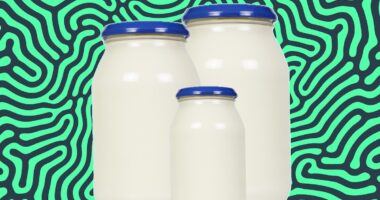Indulging in a fountain drink or even treating yourself to a milkshake once in a while is no big deal. A few cocktails with co-workers at the bi-weekly happy hour shouldn’t do any major harm. And who doesn’t love an occasional fruit smoothie in the morning? But if these small choices become daily habits, you might begin to see signs of chaos happening throughout your body.
Your diet isn’t just about the foods you eat. Drinks—and not just the alcoholic kind—can play an important part in your overall health as well. Unhealthy drinking habits can affect things like your weight, heart health, liver, mental health, and for some, even athletic performance.
Luckily, there’s no need to panic. With the help of a wide range of health and medical experts, we’re doing a deep dive into some of the worst drinking habits to avoid, so you can make the most informed choices about what you put in your body.
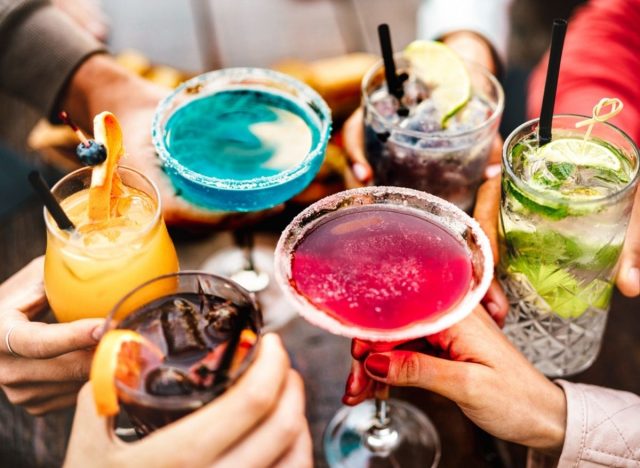

Not to be the bearer of bad news, but you likely already know that consuming alcohol regularly is one of the body’s biggest culprits for damage (if not the biggest). There have been endless streams of studies and research done on the harmful effects of drinking alcohol that have found many correlations with overall health.
When you drink an excessive amount of alcohol, just about every part of your body is impacted. A high alcohol intake has been linked to long-term health risks such as high blood pressure, heart disease, liver disease, digestive problems, higher risk of cancer, weakened immune system, as well as memory and mental health problems, according to the CDC.
The main component of alcohol that triggers the body’s functionality is called ethanol. This simple molecule is actually not so simple to metabolize or break down, which causes the formation of harmful compounds in the body and the feeling of intoxication we’re all familiar with.
In moderation, there is nothing wrong with responsibly enjoying your favorite cocktails and beers. And even though there is no universally accepted standard for what constitutes a healthy intake of alcohol, consuming five or more drinks at a time is considered to be heavy or binge drinking.
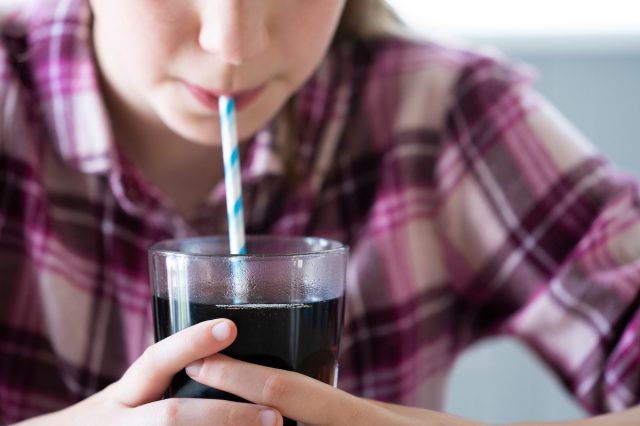

In an attempt to consume less sugar and calories throughout the day, many people turn to diet beverages. However, drinking diet soda regularly can be more harmful than you may think, especially if you’re trying to lose weight.
“Diet sodas contain artificial sweeteners which can trigger the brain to store fat…therefore even though it is void of sugar, it still can get in the way of your progress,” explains Amy Shapiro, MS, RD, CDN, a registered dietitian on the Eat This, Not That! Medical Expert Board and founder/director of Real Nutrition.
In a study published on the JAMA Network Open, researchers looked at the correlation between women and obese people drinking diet soda made with sucralose (a common artificial sweetener) and an increased appetite. There’s somewhat of a “brain reward” after consuming drinks with sucralose, which is due to the reduction in the hormone that inhibits appetite, and participants ended up consuming more food overall. Because the body’s hunger response is more easily triggered by the artificial sweeteners in diet soda, weight gain may occur anyway.
In other words, drinking soda is probably going to contribute additional calories to your diet one way or another, whether it’s because you wind up eating more after drinking diet soda, or because of the sugar in regular soda. As we all know, “when you consume excess calories quickly, you will gain weight,” Shapiro says.
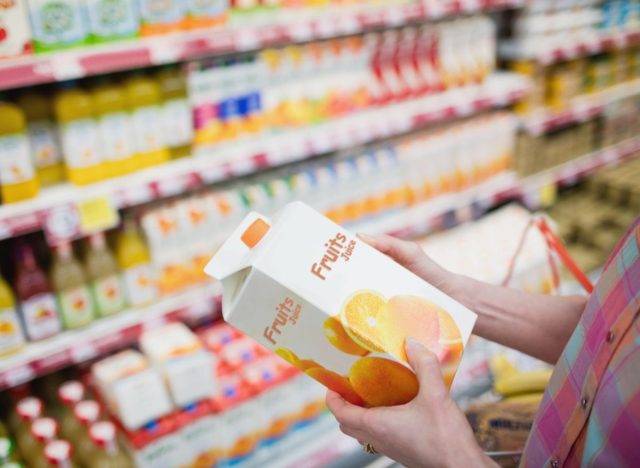

No one expects that the only liquid you’re going to consume is water. But it’s best to make a habit of drinking other liquid treats in healthy quantities, especially if you want to avoid gaining weight.
According to Shapiro, “juice, soda (regular and diet), fancy coffee drinks, and smoothies can all get in the way of your weight loss progress if you do not watch portions.” She recommends you make sure to “read labels and manage excess calories.” There’s no need to completely eliminate your beverage guilty pleasures, but if you’re not careful you run the risk of gaining weight from overconsuming calories, sugars, and fat-inducing additives.
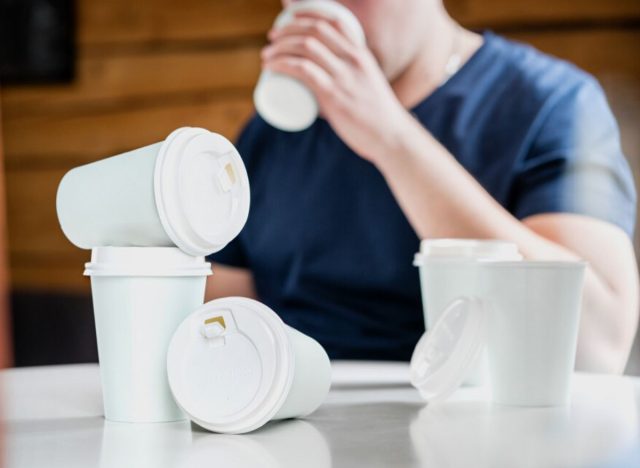

If you find yourself experiencing some withdrawal symptoms when you don’t have a caffeinated beverage during the day, then you may have developed an unfortunate drinking habit. There is such a thing as a reasonable and healthy amount of caffeine in a day, and if you’re constantly exceeding that amount, your body tends to suffer the consequences.
When you’re frequently consuming “caffeinated products like coffee and some energy drinks, [they] have the potential to increase one’s heart rate and have the heart work more than needed,” says Deena Adimoolam, MD, another Eat This, Not That! medical board expert who specializes in internal medicine and endocrinology.
“If you are a caffeine drinker, look for signs that your body is getting too much caffeine—[the] heart beating too fast, insomnia, increased anxiety, increased sweating, racing thoughts, worsening acid reflux,” Adimoolam explains. And if you are constantly experiencing these symptoms, she says, “cut back on caffeine intake and see how you feel…if your symptoms persist, then talk to your doctor ASAP.”
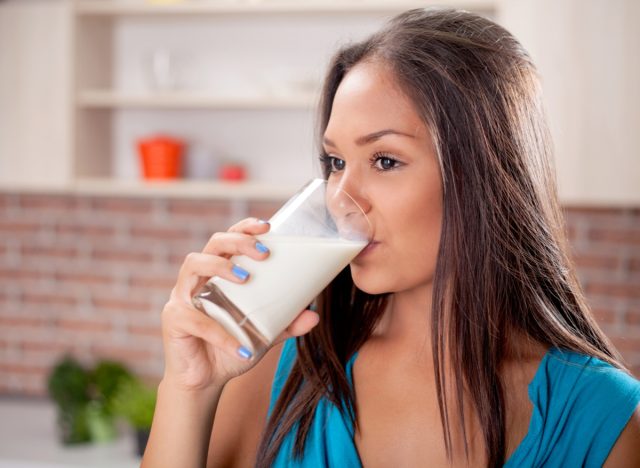

There are many drinks that can result in unsteady blood pressure, which puts your heart health at risk. One primary culprit is full-fat dairy beverages, which are quite high in saturated fats and may increase your risk of heart disease.
READ RELATED: 5 Surprising Side Effects of Eating Shrimp, Says Dietitian
The American Heart Association recommends that only 5-6% of your daily calorie intake should come from saturated fat. Some studies have shown that consuming a lot of dairy products that are high in saturated fat may increase LDL cholesterol levels (aka, the bad cholesterol) as well as heart disease.
Since making it a habit to drink fatty dairy beverages can cause your heart to become unhealthy over time, in turn, there can be other consequences to your body. “If the heart is not healthy then blood cannot be delivered to organs which are essential for life-allowing for activities like breathing, urinating, having bowel movements, etc,” Adimoolam explains.
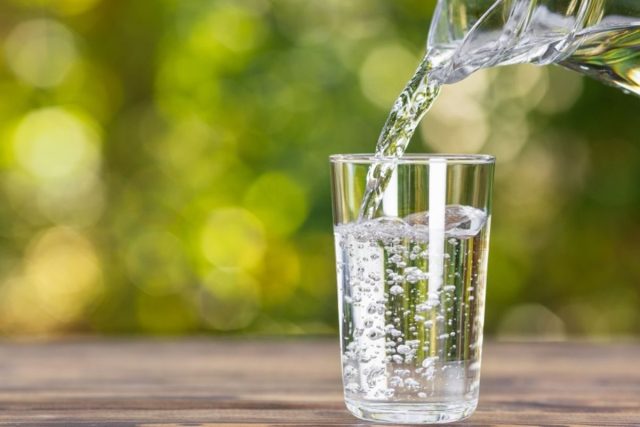

“Hydrating with plenty of plain water is a key drinking habit—your liver relies on water to function efficiently,” says Lisa Moskovitz, RD, CDN, the CEO of NY Nutrition Group and author of The Core 3 Healthy Eating Plan. Considering our bodies are made up of 60% water, it should be no surprise that our bodies as well as the organs inside them thrive most when they’re well hydrated.
The European Journal of Clinical Nutrition recently published a study that found that regularly drinking more water may lower the risk of men being diagnosed with non-alcoholic fatty liver disease (NAFLD). The participant population was more than 16,000 adults, including about 20% of men who had newly been diagnosed with NAFLD. Researchers reported that they found the odds of being diagnosed with NAFLD to be slightly lower in men who drank four to seven cups of water a day and notably lower in men who drank more than seven cups a day.
Even though NAFLD can sometimes act as a “silent disease”—with little or no initial symptoms—a sick liver can result in fatigue, abdominal pain, loss of appetite, easy bruising or bleeding, and many other health complications.
Interestingly enough, aside from water, Moskovitz says that “coffee drinkers can rejoice in knowing that [other] studies show enjoying a few cups per day can significantly reduce risk of liver cirrhosis”—that is, a damaged or scarred liver. Coffee cannot replace water, but a balance between the two will keep your liver happy and well-functioning.
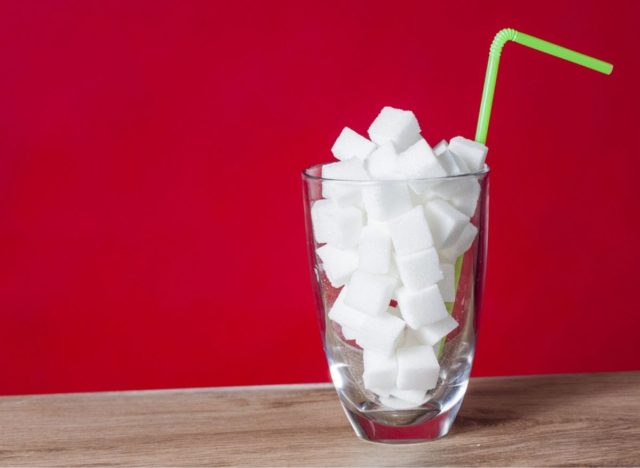

Because your liver is such a critical organ, it’s important to give it the best quality of hydration and nourishment you can. Drinking more water is step one, but step two is taking a look at the many other drinks in your daily routine that are not helping the cause.
According to a study in the journal Clinical Gastroenterology and Hepatology, drinking one or more sugar-sweetened beverages daily for five to seven years can lead to fatty liver disease. The sugars and high-fructose corn syrup that are commonly found in soft drinks, sweetened juice, or even workout beverages are turned into fat that can build up over time and cause major stress to the liver.
That being said, Moskovitz explains, by “limiting or replacing sugary beverages such as soda, juice, sports drinks, and sweetened teas with lower sugar alternatives like naturally flavored seltzer and unsweetened tea, [you] can keep your liver healthy and strong.”
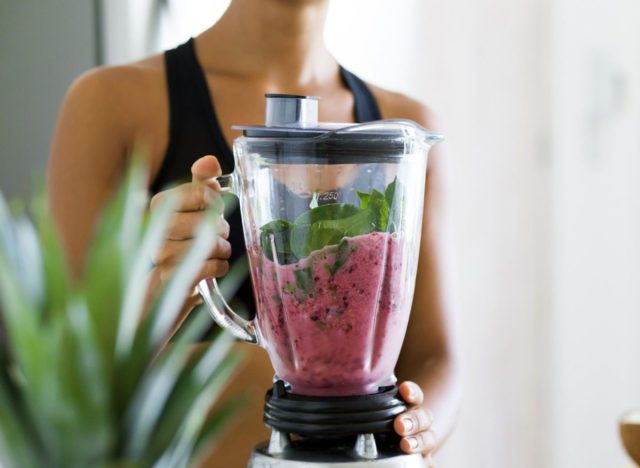

A lot of factors can affect an individual’s mental health, but there are certain lifestyle habits we are in control of that can impact our mental health for the worse. One drinking habit that isn’t doing you any favors? Packing your smoothies or pressed juices with too much sugar.
While these drinks “may have some nutrients, it’s best to get your fruit in whole form,” says Melissa Pfeister, wellness expert and founder of health and wellness brand Stripped with Melissa. Since both natural and artificial “sugar has a negative impact on your body from our gut to our brain,” Pfeister explains, you may undergo mood swings, higher levels of anxiety, trouble with sleep, and even forgetfulness when you drink them vs. eating them.
Studies have shown that eating more whole fruits and vegetables can help lower stress levels and improve mental health. In their natural form, fruits and vegetables contain micronutrients that have been shown to protect against depressive symptoms and may promote higher levels of hopefulness and self-value.
So instead of drinking a concoction that diverts healthy micronutrients, consider incorporating these 10 raw fruits and vegetables, which have been associated with better mental health, into your diet: carrots, bananas, apples, dark leafy greens like spinach, grapefruit, lettuce, citrus fruits, fresh berries, cucumber, and kiwifruit.
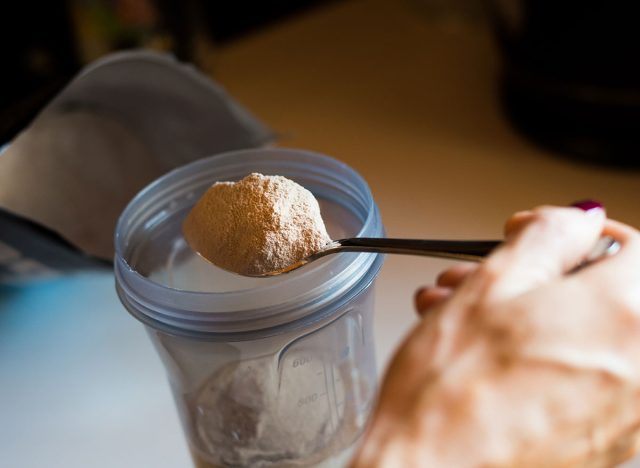

Drinking protein shakes has helped many athletes grow more muscle and improve strength. But if you start overdoing it on the protein front, your athletic performance could decline.
A study published in The Proceedings of the Nutrition Society journal found that the long-term consumption of vast amounts of protein could result in bone mineral loss and kidney damage in athletes. Your kidneys work to break down the amino acids in proteins, but if and when they are overloaded with too much protein, they may be damaged in the process of trying to keep up.
Athletes need strong kidneys and even stronger bones to train and perform. You’ll have a better chance of doing that if you’re spacing out your intake of protein beverages and choosing ones that are high in calcium. Supplementing your routine with a pre-exercise calcium and protein drink has been seen to have a much more positive effect on athletic performance than standalone protein.
Source:





